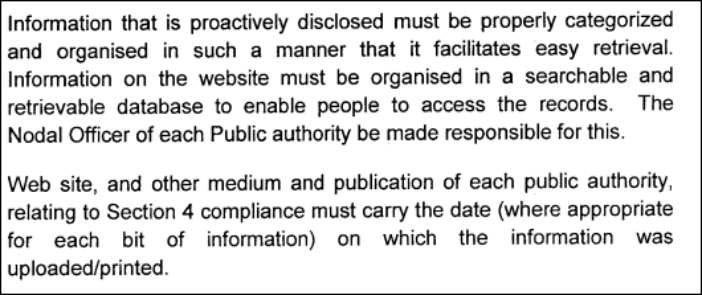[orc]The DoPT has issued an Office Memorandum (OM) with a slew of recommendations to improve the disclosures under Section 4 of the RTI act. While the recommendations have been discussed for a while now, only their proper implementation will result in greater transparency.
The Department of Personnel & Training (DoPT) issued a new Office Memorandum (OM) on Right to Information (RTI). The directions in this OM are from the list of recommendations given by a committee of experts consisting of former Information Commissioners. This committee was constituted to recommend measures to strengthen implementation of Section 4 of the RTI Act.
What does this new OM say?
One of the important measures recommended by DoPT time and again has been uploading of RTI applications and replies on the websites of respective departments. It has also been recommended previously that Departments must make an analysis of information which is sought most often from applicants and such information should be proactively disclosed on the websites.
But as Factly reported earlier, only a handful of Chief Minister’s offices have disclosed information as mandated under Section 4(1)(b) of the RTI act. And only a few central government departments have uploaded the RTI applications and their replies online. Unless government departments make an effort to constantly analyse the information needs of people and proactively disclose such information, these directions would bear no fruit. For instance, expenses on the foreign tours of ministers, the Prime Minister, advertisement expenditure of the government etc are frequently sought by the citizens. Government departments could proactively disclose such information to reduce the number of RTI applications. Unfortunately this 2012 OM from DoPT about proactive disclosure of the official tours of Ministers and officials is still not properly implemented.
Consultative Committees should be set up
The DoPT recommended setting up of consultative committees consisting of all the relevant stake holders (like representatives of civil society) in various departments. The committees should hold regular meetings and advice the public authorities on what information is to be uploaded proactively.
There are examples of such consultative committees across the country. The Municipal Corporation of Greater Mumbai has a technical advisory committee to look into RTI matters. The Government of Andhra Pradesh in 2012 had set up a high level committee to look into RTI related issues at the state and district levels. These committees also had representation from the civil society.
Information & Facilitation Center should be set up
The DoPT also recommended setting up of Information & Facilitation Centers (IFC) to educate citizens about the information & documents available on the website of departments. This might help common citizens understand the kind of information & documents available with the relevant department. Indexing and cataloguing of records is already mandated under Section 4 of the RTI act.
Form a committee of PIOs with rich experience of RTI
The DoPT recommends setting up of a committee consisting of Public Information Officers (PIOs) and First Appellate authorities (FAAs) with rich experience of dealing with RTI applications and appeals. This committee is supposed to identify the categories of information frequently asked by the citizens. This committee could be clubbed with the consultative committee.
Proactively disclosed information must be properly organized
The DoPT also recommends that the proactively disclosed information be properly categorized and organized that it facilitates easy retrieval. The disclosures should also be organized in a searchable and retrievable database and also contain the last updated date. This step could ensure easy access of this information to the common citizens.
Undertake Transparency Audits
The DoPT also recommends transparency audits of various departments to be undertaken by the respective state training institutes. Center for Good Governance had previously developed an audit toolkit that could be used for the transparency audit of proactive disclosures by departments. The toolkit could be improvised to suit the needs of individual departments. The audits if done properly would help departments understand how transparent they are and take corrective action.

The recommendations, if properly implemented can truly enhance the transparency in the working of the government and reduce the load of RTI applications at the same time.







1 Comment
In fact, a positive/negative list (department-wise) of such information which can/cannot be disclosed either wholly or partially can be prepared. While compiling the list, the Government’s endeavour is to attain the objectives of the RTI Act, of course, without jeopardizing the financial stability and economic interests of the State.